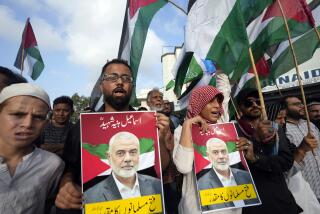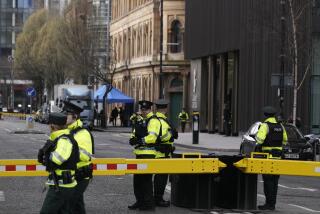London Blast Shows Risks of Clintonâs Peace Formula
WASHINGTON â President Clinton vowed Saturday to continue trying to promote peace in Northern Ireland, despite a bombing in London that demonstrates anew just how much his foreign policy is vulnerable to a handful of terrorists with access to deadly explosives.
As he hones his presidential reelection campaign, Clinton is focusing his foreign policy on efforts to mediate--or sometimes impose--peace between warring factions from the Middle East to the Balkans, from Haiti to Northern Ireland.
It is a strategy that might pay enormous dividends in terms of both global stability and domestic politics. But it is subject to attack by groups outside the U.S.-brokered peace processes and beyond the administrationâs control.
Since the first of the year, Clinton and his top aides have met with the recognized political leadership of the various factions in the complex Northern Ireland dispute, urging them to move ahead with negotiations to convert a 17-month cease-fire into a permanent peace. He has received assurances of cooperation in all of the meetings.
But as Fridayâs deadly blast made clear, assurances from political leaders can be overridden by men with guns and bombs.
The outlawed Irish Republican Army claimed responsibility for the London bombing, breaking the cease-fire and threatening to torpedo the entire peace process. But Gerry Adams, head of the IRAâs legal political wing who met Clinton at the White House earlier this month, insisted he did not order the attack and did not even know in advance about the plot.
For the time being, the White House has accepted Adamsâ statement that he was kept in the dark, even though the Sinn Fein leader telephoned Clintonâs national security advisor, Anthony Lake, about an hour before the blast to warn that the situation was becoming increasingly dangerous. Adams told the British Broadcasting Corp. on Saturday that the call to Lake was prompted by the IRAâs public announcement that it no longer was bound by the cease-fire, not by knowledge of the specific plot.
*
White House officials, hoping that Adams will try to persuade IRA military units to hold their fire, carefully avoided urging the Sinn Fein leader Saturday to condemn the attack, something he had already refused to do, although he expressed sympathy for the victims.
The fact that Adams thought it necessary to warn Lake demonstrates how central the White House has become to efforts to end a quarter of a century of strife in Northern Ireland between the mostly Protestant majority, which wants to retain ties with Britain, and a mostly Roman Catholic minority, which wants to unite with the Republic of Ireland to the south.
It also underlines the inherent flaw in the administrationâs strategy: If political leaders such as Adams canât head off terrorist bombings, what is the point of negotiating with them?
Nevertheless, Clinton pledged to continue on his present course.
âThis attack was aimed at the growing prospects for peace, a just and lasting peace in Northern Ireland,â Clinton told reporters at the White House as he left for a political trip to Iowa.
A White House official said Clinton expects to go ahead with a previously scheduled meeting Monday with David Trimble, a leader of the Protestant Unionist faction, although it is possible that the bombing will postpone it.
âWe have received pledges from all of the parties to continue the peace process,â the official said. âThe question is, how does the bombing affect the peace process? It is too early to say. Weâre going to let the dust settle first.â
For the administration, the dilemma posed by the IRA attack in the face of negotiations with Adams is becoming a familiar one.
In the Middle East, the administration acts as broker between Israel and Palestinian leader Yasser Arafat despite Arafatâs inability to stop terrorist attacks by Palestinian guerrillas.
In Bosnia-Herzegovina, a U.S.-mediated peace accord is coming under severe pressure from Bosnian Serbs who do not feel bound by the agreement signed by Serbian President Slobodan Milosevic.
Times staff writers Doyle McManus in Iowa and Stanley Meisler in Washington contributed to this report.
More to Read
Sign up for Essential California
The most important California stories and recommendations in your inbox every morning.
You may occasionally receive promotional content from the Los Angeles Times.










